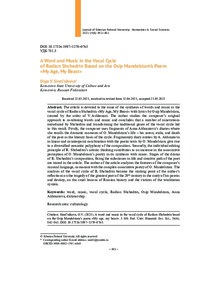Слово и музыка в вокальном цикле Родиона Щедрина на стихи Осипа Мандельштама «Век мой, зверь мой»
Скачать файл:
URI (для ссылок/цитирований):
https://elib.sfu-kras.ru/handle/2311/141352Автор:
Синельникова, О. В.
Sinel’nikova, Olga V.
Дата:
2021-06Журнал:
Журнал Сибирского федерального университета. Гуманитарные науки. Journal of Siberian Federal University. Humanities & Social Sciences; 2021 14 (6)Аннотация:
Статья посвящена проблеме синтеза слова и музыки в вокальном цикле
Родиона Щедрина «Век мой, зверь мой» на стихи Осипа Мандельштама, созданном
по заказу В. Ашкенази. Автор исследует оригинальный подход композитора
к сочетанию слова и музыки и делает выводы, что к этому результату приводит ряд
новаций, введенных Щедриным и преобразующих традиционный жанр вокального
цикла. Во-первых,
в качестве литературной основы цикла композитор использует
фрагменты дневников Анны Ахматовой, где она вспоминает о драматических
минутах жизни О. Мандельштама – об аресте, ссылке, гибели поэта. Отрывочные
дневниковые записи А. Ахматовой в линейном и контрапунктическом соединении
с поэтическими текстами О. Мандельштама рождают многоплановую смысловую
полифонию произведения. Во-вторых,
индивидуальный монтажный принцип
художественного мышления Р. Щедрина способствует повышению ассоциативного
восприятия поэзии О. Мандельштама в ее синтезе с музыкой. В тексте статьи
прослеживаются этапы драматургии произведения Р. Щедрина, фиксирующие
вехи жизненного и творческого пути поэта. Автор статьи анализирует особенности
музыкального языка композитора, созвучные сложно-ассоциативной
поэзии
О. Мандельштама. Анализ вокального цикла Р. Щедрина стал отправной точкой
размышлений автора статьи о трагедии величайшего поэта XX века в единстве его
искусства и судьбы, о жестоких уроках российской истории и жертвах тоталитарного
строя The article is devoted to the issue of the synthesis of words and music in the vocal cycle of Rodion Shchedrin «My Age, My Beast» with lyrics by Osip Mandelstam, created by the order of V. Ashkenazi. The author studies the composer’s original approach to combining words and music and concludes that a number of innovations introduced by Shchedrin and transforming the traditional genre of the vocal cycle led to this result. Firstly, the composer uses fragments of Anna Akhmatova’s diaries where she recalls the dramatic moments of O. Mandelstam’s life – his arrest, exile, and death of the poet as the literary basis of the cycle. Fragmentary diary entries by A. Akhmatova in linear and counterpoint combination with the poetic texts by O. Mandelstam give rise to a diversified semantic polyphony of the composition. Secondly, the individual editing principle of R. Shchedrin’s artistic thinking contributes to an increase in the associative perception of O. Mandelstam’s poetry in its synthesis with music. Stages of the drama of R. Shchedrin’s composition, fixing the milestones in life and creative path of the poet are traced in the article. The author of the article analyzes the features of the composer’s musical language, consonant with the complex-associative poetry of O. Mandelstam. The analysis of the vocal cycle of R. Shchedrin became the starting point of the author’s reflections on the tragedy of the greatest poet of the 20th century in the unity of his poems and destiny, on the cruel lessons of Russian history and the victims of the totalitarian system

